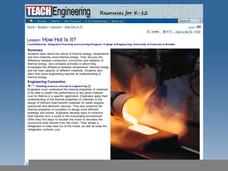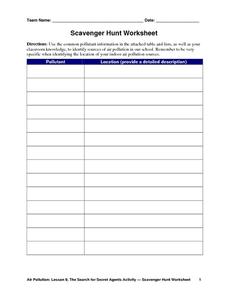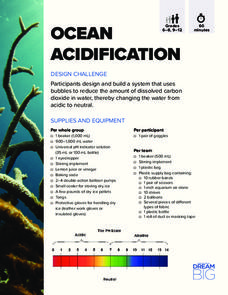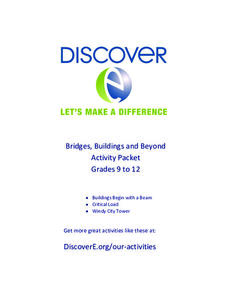Curated OER
Fourth Grade Science
In this science instructional activity, 4th graders complete multiple choice questions about electricity, the sun, sound, and more. Students complete 25 questions.
Curated OER
Reading Comprehension 5: level 11
Use this reading comprehension exercise at the beginning of the year to assess the reading comprehension level of your class, to remind readers of how to use strategies to decode dense text, or to assess the skills of a new student....
Teach Engineering
How Hot is Hot?
Elementary schoolers identify the three methods of heat transfer: conduction, convection, and radiation. The instructional activity is mostly lecture-based. When the teacher has finished the presentation, groups of pupils get into teams...
Polar Trec
Family Polar Fun Day
Family fun days are great for connecting home and school life, building strong parent/teacher relationships, and engaging students in a fun and social way. Here are several activity ideas to help you and your class run your own Family...
Exploratorium
Magnetic Suction
Drive an electric current through a coil of wire and show how it can pull a nail right into its core. This vivid demonstration exhibits the electromagnetic field. Consider also showing your class a few of the devices that make use of...
Curated OER
Scavenger Hunt Worksheet
Exactly how environmentally friendly is your school? From the air fresheners in the bathrooms to the cleaning solvents used in the classrooms, young conservationists search the school grounds for sources of air pollution in...
Consumers Energy
Circuits and the Flow of Electricity Lesson Plan
I think I lost an electron. Are you sure? Yes, I'm positive! Starting with a hands-on demonstration and problem solving activity, young scientists define vocabulary related to circuitry and currents. Then they build their own circuits...
NASA
Foam Rocket
When going for distance, does it make a difference at what angle you launch the rocket? Teams of three launch foam rockets, varying the launch angle and determining how far they flew. After conducting the series of flights three times,...
Chymist
Make a Low Energy Radio Transmitter
How do you demonstrate radio transmissions? Pupils build a low-energy radio transmitter by constructing two coils from magnet wire and connecting them to audio/phone plugs. The resource provides the details on how to build the...
American Chemical Society
Man and Materials Through History
From the start of the Industrial Revolution, it only took 147 years for someone to invent plastic. This may seem like a long time, but in the history of inventing or discovering new materials, this is incredibly fast. An informative and...
Exploratorium
Motor Effect
The magnetic wire. Class members create a magnetic field by running electricity through a wire. The video included in the resource provides information on how this effect is used to make electrical motors.
Rochester Institute of Technology
Electrical Energy
My friend told me how electricity is measured and I was like Watt! In the hands-on activity, learners explore electricity by building circuits, both parallel and series. They also determine how increasing the number of light bulbs and...
DiscoverE
Ocean Acidification
Combat ocean acidification with bubbles. Young engineers create a system that reduces the acidity of water. Dry ice in water helps simulate ocean acidity, and blowing bubbles into the water results in a gas exchange that neutralizes the...
DiscoverE
Building Begins with a Beam
A sturdy beam made of foam seems like an oxymoron. Scholars design a 48-inch beam that can hold a one-pound weight. The beam should be sturdy enough so it doesn't bend too much. If it does, the egg placed underneath the beam will break.
DiscoverE
Build a Roller Coaster
Let the good times roll as young thrill seekers build a roller coaster on school grounds. Future engineers design and build a roller coaster from flexible tubing. The roller coaster is for a marble, so there will be plenty of room to let...
DiscoverE
Bridges, Buildings and Beyond Activity Packet: Grades 9-12
Shore up engineering knowledge with some building activities. Scholars design a foam beam, create a structure from playing cards, and construct a paper tower that won't topple over in the wind. Along the way, they learn about engineering...
Curated OER
Life in the Crystal Palace
Marine biologists research sea ice communities. Assign some groups to construct paper models of sea ice communities in winter, and some to construct models of them in summer. The lesson is simplistic, but the Internet resources provided...
Desert Discovery
Saguaro Parts
Young biologists identify the basic structures of a saguaro cactus. They study the functions of each of the structures, and label them on a picture of a saguaro cactus embedded in the plan. This simple, and easy-to-implement...
Curated OER
Survival in Antarctica
Explore the harsh climate of Antarctica and its wildlife. Participate in experiments to determine how humans survive in the continent's climate, and address the difficulties faced by scientists.
Curated OER
Lost on Everest
What would it be like to be stranded on Mount Everest? Curious learners view a video clip, test common fabrics to see how they stand up to cold, and develop/answer discussion questions.
Curated OER
#24 How Much Air Is In Foamed Polystyrene Products?
Students are challenged to come up with a good estimate of the amount of air in foamed polystyrene products. They use this gas evolution experiment and as such have students measure the gas generated when foamed polystyrene is degassed...
Curated OER
The Bean Book
A well-designed book on beans teaches kids about the anatomy of a bean. They cut out parts of a bean and paste them together. There are a lot of good descriptions of the parts of beans, such as the embryo, stored food, and the seed coat....
Curated OER
Exploring Electricity - Four Activities
These are four classic activities used for instructing upper elementary electricians. The first involves experimenting with the Van de Graaff generator. The second is a series of hands-on experiences with static. In the third activity,...
Curated OER
Point- vs. Non-point Pollution
Students differentiate between point and non-point pollution and determine how the different types of pollution are harmful to aquatic ecosystems. They complete a series of tests on a sample of "polluted" water and a sample of "pure" water.
Other popular searches
- Conductors and Insulators
- Conductors Insulators
- Conductor Insulators
- Thermal Insulators
- Best Insulators
- Science Thermal Insulators
- Heat Insulators
- Water Temperature Insulators
- Conductors Insulators Heat
- Insulators Ice Cube
- Good Insulators
- Conductor and Insulators

























